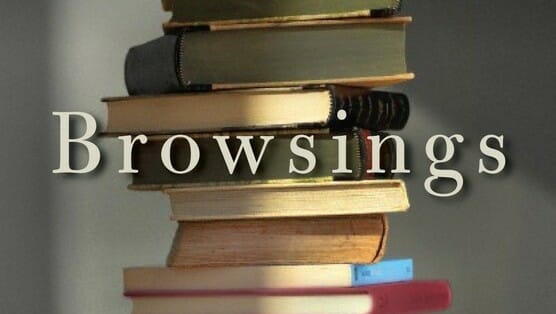
Michael Dirda is not a book critic.
Well, the Washington Post Dirda—the Pulitzer-winning, New York Review of Books-contributing, 5,000-word essay/review hybrid-birthing Dirda—is, among the very best of them. In fact, he’s known as “The Best Read Man In America” (a deific bestowed upon him by him by John Lingan at The Paris Review) and one of the most intelligent—per Washington Magazine—men in the District.
 But Browsings Dirda is not. This collection of Dirda’s eponymous Friday columns for The American Scholar’s website hazards precious few opinions on the written word which could be considered criticism; it is instead a collating of a self-declared bookman’s views on his holistic cohabitation—they line his walls, buttress his home’s foundation, rest in every sulci of his brain—with books.
But Browsings Dirda is not. This collection of Dirda’s eponymous Friday columns for The American Scholar’s website hazards precious few opinions on the written word which could be considered criticism; it is instead a collating of a self-declared bookman’s views on his holistic cohabitation—they line his walls, buttress his home’s foundation, rest in every sulci of his brain—with books.
“As readers of Browsings will discover in the weeks to come, I’m pretty much what used to be called a ‘bookman,’” Dirda writes in his opening essay. “This means, essentially, that I read a lot and enjoy writing about the books and authors that interest me.”
Sometimes, Dirda goes on to explain, such writings are reviews (like this one!); sometimes they are essays (like the ones being reviewed).
“But my tone,” Dirda writes, “aims to remain easygoing and conversational, just me sharing some of my discoveries and enthusiasms.”
This concisely and conversationally wraps up the offerings found in Browsings. So for those looking for something more akin to fellow DC-based bookman/journalist Christopher Hitchens’ Arguably, offering incisive criticism and no small amount of black mamba quality venom … well, move along.
What Dirda offers in Browsings is more approachable, more, well, fun. He hews to literary dogmas both traditional—books, real hold-in-your-hand books, are best!—and happily populist: a reader should be encouraged to “drift slowly along with Hercule Poirot” if they so wish, without fear of condemnation or condescension.
Dirda’s selections—laid bravely and frequently out to bear—belay this; his personal tastes tack heavily towards the Delphic, the pulpy, science fiction and specters, detectives and girls and ghouls. Sure, he draws many of these tales from the Victorian era, and the authors are all quite esoteric to one without Dirda’s encyclopedic knowledge of the great genre novels. But Browsings’ love of honest-to-God enjoyable stories lofts it to that most noble of bookman’s goals: the reader will actually want to go out and buy the books Dirda so obviously adores, be they about spaceships or Sherlock Holmes.
Fittingly for such subject matter, the essays of Browsings can often read like (a particularly eloquent and charmingly cordial) fanboy’s ruminations, which a few of these essays actually are. There are multiple instances of lists—a litany of titles recommended, a squadron of old favorites called off, a fantastic collection of books praised or catalogued as hunting manifests from his frequent expeditions into the sundry and musty used book stores of the land.
Dirda the lepidopterist is the most exciting. His book shopping tales, which usually involve a touch of Kingsley-esque color (“my systematic exploration of its labyrinthine fiction-rich basement”) and a bit of self-flagellation over the accrued costs, compose the real core of the bookman’s life: the hunt.
Yet that fine line walked between elucidating and unintelligibly erudite is paradoxically both Browsings’ greatest strength and single fault. The friendly, affable Dirda within its pages is enjoyable, but one familiar with his other work—or who simply finds, in “Synonym Toast,” a tiny example of the brilliant rhetorical flair he can bring to writing on words and books—longs for a bit of showmanship. Yes, the introductory essay served as much as a warning as a welcome to these readers, but the flash we get brings forth a hunger for the kill, for the eyeteeth to be bared—if only a little.
But friendly bookman Dirda is fine company, especially in the bite-sized doses of Browsings. Perhaps it is the endless parade of titles from either side of the turn of the 20th century or the frequent allusions to reading as an older pleasure that leads one to feel that the bookman of Dirda’s stripe is an endangered creature, doomed to wander amongst the stacks of forgotten novels until one day the bones between the boxes resemble the much adored paper between the covers.
This could not be further from the truth. A cursory glance at the endless supply of book-themed articles, quizzes, lists and ephemera offered by such a new media institution as BuzzFeed proves the idea wrong. These are typically not reviews, literary criticism or even essays; they often appear to have little to do with the written word at all.
But they are a new generation—a new medium—bathed in books, the browsings of a culture of literary polymaths and ambassadors like Dirda have begot.
B. David Zarley is a freelance journalist, essayist and book/music/art critic currently based in Chicago. A former book critic for The Myrtle Beach Sun News, his work can be seen in VICE, VICE Sports, Pitchfork, Sports on Earth, The Classical and New American Paintings, among numerous other publications. You can find him on Twitter or at his website.